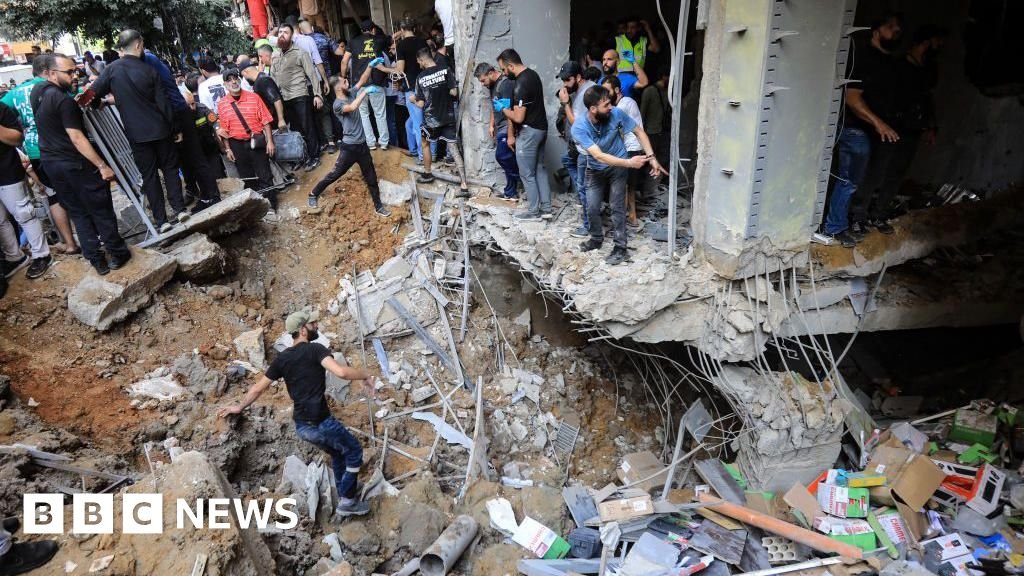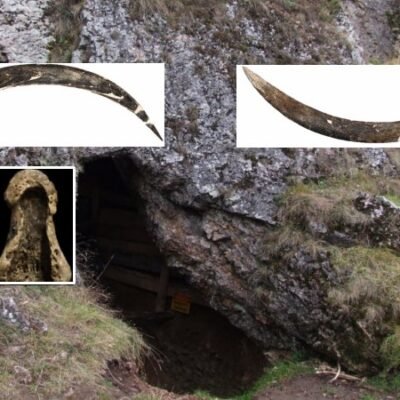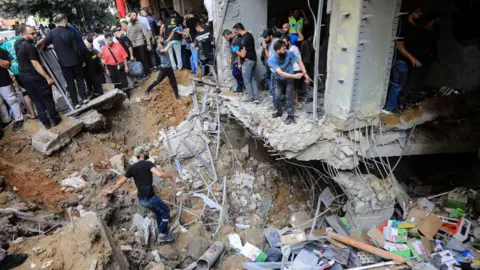 Getty Images
Getty ImagesA top Hezbollah military commander was killed in an Israeli air strike on the Lebanese capital Beirut on Friday, in a major escalation that has added to fears of an all-out war.
Hezbollah confirmed Ibrahim Aqil’s death after Israel said he was one of several senior Hezbollah figures killed in the strike.
Earlier, Lebanese officials said at least 14 people were killed and dozens injured in the strike that hit the densely populated Dahieh area, a stronghold of the Iran-backed group in the city’s southern suburbs.
There were chaotic scenes as emergency teams rushed to the site of the attack, rescuing the wounded and searching for people believed to be trapped under the rubble. At least one residential building collapsed and others were heavily damaged.
Streets were closed by Hezbollah members, some looking incredulous as the attack represented another humiliating blow in a week which saw pagers and walkie-talkies belonging to the group explode.
Dozens were killed and thousands wounded in those attacks, widely believed to be orchestrated by Israel.
Friday’s strike was the first to hit Beirut since July, when Hezbollah’s military chief Fuad Shukr was killed.
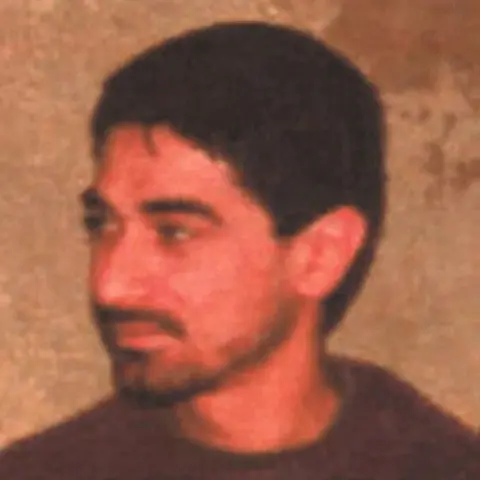 US Government
US GovernmentIn a statement, Israel Defense Forces (IDF) spokesman Daniel Hagari said Aqil, a senior commander in Hezbollah’s elite Radwan forces, was killed alongside senior operatives in the group’s operations staff and other Radwan commanders.
Hagari said the individuals killed were “planning Hezbollah’s ‘Conquer the Galilee’ attack plan, in which Hezbollah intended to infiltrate Israeli communities and murder innocent civilians”.
The plan was first reported by the Israeli military in 2018, when the IDF said it was blocking tunnels dug by Hezbollah to penetrate Israeli territory and kidnap and murder civilians.
In April, Washington said it was searching for Aqil, also known as Tahsin, and offered financial rewards to anyone with “information leading to his identification, location, arrest and/or conviction”.
He was wanted by the US due to his links and seniority within Hezbollah, a group that has been proscribed a terrorist organisation by Israel, the UK, US and other countries.
In the 1980s, Aqil was a member of the group that orchestrated the bombings of the US embassy in Beirut and a marine barracks, killing hundreds of people.
Confirming Aqil’s death in a post on social media, Hezbollah described him as one of its “great jihadist leaders”.
The group was established in the early 1980s by the region’s most dominant Shia power, Iran, to oppose Israel. At the time, Israel’s forces had occupied southern Lebanon during the country’s civil war.
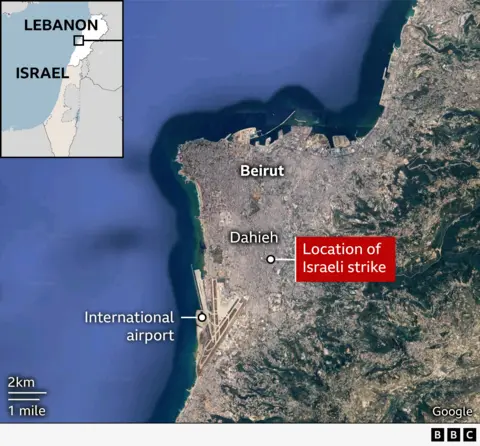
Earlier on Friday, Hezbollah said it had launched strikes on military sites in northern Israel. The IDF said 140 rockets were fired into the north of the country, while Israeli police issued warnings about damage to roads.
It came after Israel carried out extensive air strikes on southern Lebanon, saying its warplanes had hit more than 100 Hezbollah rocket launchers and other “terrorist sites” including a weapons storage facility.
The cross-border fighting between Israel and Hezbollah escalated on 8 October 2023 – the day after the unprecedented attack on Israel by Hamas gunmen from Gaza – when Hezbollah fired at Israeli positions in solidarity with the Palestinians.
Since then hundreds of people, most of them Hezbollah fighters, have been killed in the cross-border fighting, while tens of thousands have also been displaced on both sides of the border.
Israel recently added the return of people displaced from the north of the country to its list of war goals, and Defence Minister Yoav Gallant said on Thursday that his country is entering a “new phase of the war”, concentrating more of its efforts on the north.
After the pager and walkie-talkie explosions across Lebanon earlier this week, there has been a deepened sense of unease in the Middle Eastern country.
It was an unprecedented security breach that indicated how deeply Israel had managed to penetrate the group’s communication system.
Many of the explosions occurred simultaneously, with walkie-talkie explosions on Wednesday occurring in the vicinity of a large crowd that had gathered for the funerals of four victims of Tuesday’s pager blasts.
Hezbollah and Lebanese authorities have blamed Israel for the explosions.
Israeli officials have not commented on the allegations, but most analysts agree that it is behind the attack.
In a televised address on Thursday, Hezbollah leader Hassan Nasrallah said: “The enemy crossed all rules, laws and red lines. It didn’t care about anything at all, not morally, not humanely, not legally.”
Nasrallah vowed a harsh punishment, but indicated his group was not interested in an escalation of its current conflict with Israel.
Lebanese foreign minister Abdallah Bou Habbib told the UN Security Council on Friday that Israel had “deliberately undermined” diplomatic efforts for a ceasefire in Gaza and “all attempts of the Lebanese government to de-escalate and exercise self-restraint”.
Israel’s UN envoy Danny Danon said that while his country is not seeking a wider conflict, it “will not allow Hezbollah to continue its provocation”.
US and UK authorities have urged their citizens not to travel to Lebanon. The White House said it was involved in intense diplomacy to prevent escalation of the conflict along the Israel-Lebanon border.
Reiterating previous calls, the UK Foreign Office said it is “continuing to advise people to leave Lebanon now while commercial routes remain available”.
The BBC understands that during a Cabinet Office Briefing Room (COBR) meeting officials discussed ongoing preparedness work, particularly with regards to British nationals, should there be any further escalation.

